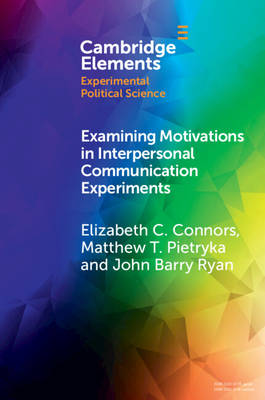
Door een staking bij bpost kan je online bestelling op dit moment iets langer onderweg zijn dan voorzien. Dringend iets nodig? Onze winkels ontvangen jou met open armen!
- Afhalen na 1 uur in een winkel met voorraad
- Gratis thuislevering in België vanaf € 30
- Ruim aanbod met 7 miljoen producten
Door een staking bij bpost kan je online bestelling op dit moment iets langer onderweg zijn dan voorzien. Dringend iets nodig? Onze winkels ontvangen jou met open armen!
- Afhalen na 1 uur in een winkel met voorraad
- Gratis thuislevering in België vanaf € 30
- Ruim aanbod met 7 miljoen producten
Zoeken
Examining Motivations in Interpersonal Communication Experiments
Elizabeth C Connors, Matthew T Pietryka, John Barry Ryan
€ 28,95
+ 57 punten
Omschrijving
Does interpersonal political communication improve the quality of individual decision making? While deliberative theorists offer reasons for hope, experimental researchers have demonstrated that biased messages can travel via interpersonal social networks. We argue that the value of interpersonal political communication depends on the motivations of the people involved, which can be shifted by different contexts. Using small-group experiments that randomly assign participants' motivations to seek or share information with others as well as their motivations for evaluating the information they receive, we demonstrate the importance of accounting for motivations in communication. We find that when individuals with more extreme preferences are motivated to acquire and share information, collective civic capacity is diminished. But if we can stimulate the exchange of information among individuals with stronger prosocial motivations, such communication can enhance collective civic capacity. We also provide advice for other researchers about conducting similar group-based experiments to study political communication.
Specificaties
Betrokkenen
- Auteur(s):
- Uitgeverij:
Inhoud
- Aantal bladzijden:
- 75
- Taal:
- Engels
- Reeks:
Eigenschappen
- Productcode (EAN):
- 9781009114288
- Verschijningsdatum:
- 3/11/2022
- Uitvoering:
- Paperback
- Formaat:
- Trade paperback (VS)
- Afmetingen:
- 152 mm x 229 mm
- Gewicht:
- 131 g

Alleen bij Standaard Boekhandel
+ 57 punten op je klantenkaart van Standaard Boekhandel
Beoordelingen
We publiceren alleen reviews die voldoen aan de voorwaarden voor reviews. Bekijk onze voorwaarden voor reviews.











